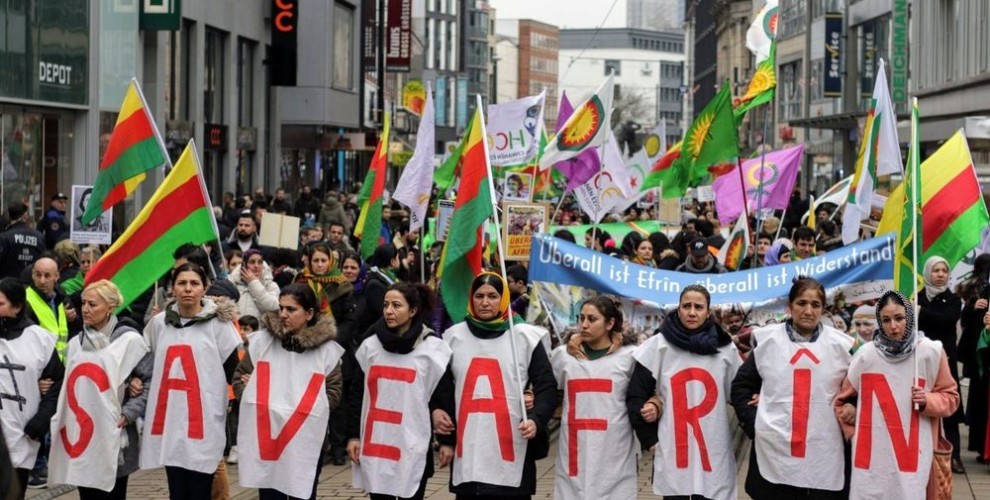Important legal victory for Kurds in Germany
The Dusseldorf Administrative Court ruled that the police banning the march NAV-DEM wanted to hold under the title “End the War in Afrin” was against the law.
The Dusseldorf Administrative Court ruled that the police banning the march NAV-DEM wanted to hold under the title “End the War in Afrin” was against the law.

The German state has been criminalizing the Germany Democratic Kurdish Society Center (NAV-DEM), the biggest umbrella organization of Kurds which houses dozens of associations. Despite being a legal institution, NAV-DEM has been subjected to arbitrary police discrimination due to the notices the Interior Ministry sent to the 16 states in the country in 2017 and 2018.
The Interior Ministry notices alleged that “NAV-DEM is part of the PKK”, and this was used to ban the marches the Kurds wanted to hold. The first instance of this ban happened in February 2018 in Dusseldorf. The police refused to give permits to the march NAV-DEM wanted to hold in the city to protest the Turkish state’s invasion attacks against Afrin, citing the Interior Ministry notice.
The preemptive ban of NAV-DEM’s “End the War in Afrin” March was taken to court last year. The Dusseldorf Administrative Court issued a verdict on the case in yesterday's hearing.
“KURDS’ MARCHES CANNOT BE BANNED FOR THESE REASONS”
The court ruled that the ban against NAV-DEM’s march is against the law. The court’s chief judge verbally expanded the verdict and said, “There are sharp differences between the democratic society center NAV-DEM e.V. and the banned PKK.”
The judge also stated that the police cannot ban Kurds’ marches or gatherings with the given reasons and continued: “The ‘End the War in Afrin’ march planned for February last year with an estimated attendance of 2.000 did not constitute a threat against public safety as the police alleged in their ban.”
The judge said the Dusseldorf police acted outside the law and added: “Individual opposition to criminal law cannot form a basis for a blanket ban against gatherings and marches. Participants wishing to exercise their constitutional right to gatherings and marches should not be prohibited due to unrelated illegalities.”
THEUNE: THE COURT VOIDED THE POLICE’S ASSUMPTIONS
NAV-DEM’s defense lawyer Lucas Theune said the ruling is very important for Kurds in Germany. Theune said the extended ruling in particular was positive, and added: “The court stated in all clarity that the police’s assumption that NAV-DEM is a sub-organization of the PKK is void.”
Theune said he expects marches and protests by Kurds will get permits without issues after this ruling in Dusseldorf. The German state had previously instated “police state” laws against the Kurdish Freedom Movement, banning protests before they happened because illegal activities “could” take place. Many lawyers and politicians objected to this practice.
A prominent one among them was former Interior Minister Gerhart Baum. The former minister from the Free Democrats Party (FDP) said Germany has a very wide right to protest and this right is guaranteed under the law, and added: “Even if there is a possibility for violence in a demonstration, the protest should be permitted. Banning protests before they happen goes against the constitution.
NOTICES SIMILAR TO DECREES AGAINST KURDS
The Interior Ministry first issued a notice to all states on March 2, 2017 demanding a ban to flags/banners of PYD, YPG, YPJ and several other Kurdish parties and organizations. A year later, on January 29, 2018, it came to light that the ministry issued another notice that was similar to the Erdogan regime's KHKs (Statutory Decrees).
The notice demanded stricter observation of the PKK ban in all states in Germany and stressed the ban against all “visible and audible” symbols, writings and sounds that are reminiscent of the PKK in public. The ministry demanded bans against protests, on suspicion that “PKK propaganda may take place even if under different names”.
Shortly after this notice, genocidal operations against Kurds in Germany accelerated. First, protests to support the Afrin resistance aiming to let the world know the Turkish state’s massacres were banned before they happened. Then, in a move similar to the AKP’s police, Kurdish institutions and associations were attacked by the German police.